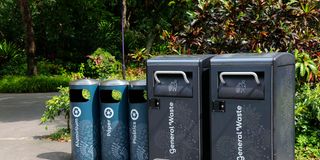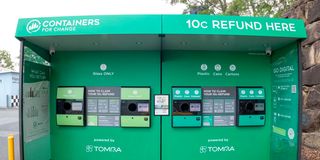Transforming waste management: Innovations shaping Africa's future

In Kigali, Rwanda, smart bins installed in commercial districts have improved collection efficiency by 30 per cent in pilot areas. These systems provide real-time data on bin fill levels, enabling dynamic route planning and resource allocation.
What you need to know:
- Waste generation across Africa is expected to triple by 2050, with current production already straining existing infrastructure.
As Africa confronts an escalating waste management crisis, emerging technologies offer promising solutions to a problem that threatens both environmental and public health. According to World Bank projections, waste generation across Africa is expected to triple by 2050, with current production already straining existing infrastructure. This crisis, marked by a mere four per cent recycling rate despite 70-80 per cent of waste being recyclable, demands innovative approaches that have proven successful in other regions.
The scale of the challenge
Africa's waste management challenges stem from rapid urbanisation, population growth, and changing consumption patterns. Current waste collection rates average 55 per cent across the continent, significantly lower than the global average of 74 per cent.

People collect recyclable materials at the Dandora dumpsite in Nairobi.
The uncollected waste often ends up in uncontrolled dumpsites, creating environmental hazards and public health risks. Major cities like Lagos, Nigeria, generate approximately 13,000 metric tonnes of waste daily, with similar challenges faced in Nairobi, Kenya, and Cairo, Egypt.
Such challenges have given way to countless waste-related problems. Open burning contributes to air pollution, while liquid waste contaminates water sources, and overflowing dumpsites release methane, a potent greenhouse gas, into the atmosphere.
Luckily, as waste increasingly overwhelms cities, innovative technologies are emerging as essential tools to revolutionise waste management practices. Here are some key advancements that could shape the future of waste management across Africa.
Smart waste collection systems
Imagine a waste bin that automatically knows when it's full and alerts the collection service. This is the essence of smart bins equipped with real-time sensors to monitor waste levels. This technology is crucial for urban areas struggling with litter and overflowing trash.
It then translates to optimising collection schedules based on actual needs, through which municipalities can reduce operational costs and improve public cleanliness. The data generated from these bins also offers insights into waste generation patterns, allowing cities to develop more effective waste management strategies.
The integration of Internet of Things (IoT) sensors in waste management has revolutionised collection efficiency worldwide. In Barcelona, Spain, smart bins equipped with fill-level sensors have reduced collection costs by 40 per cent while minimising vehicle emissions. Similar systems in Singapore have optimised collection routes, reducing fuel consumption by 20 per cent.
African cities are beginning to adopt these technologies. In Kigali, Rwanda, smart bins installed in commercial districts have improved collection efficiency by 30 per cent in pilot areas. These systems provide real-time data on bin fill levels, enabling dynamic route planning and resource allocation.

A recycling kiosk. Advanced recycling technologies are revolutionising how we handle materials that typically end up in landfills.
Waste-to-energy technologies
Waste-to-energy (WtE) is a transformative process that converts various types of waste into usable energy, such as electricity or heat. This method addresses two pressing issues: the growing volume of waste and the need for renewable energy sources.
Organic materials, plastics, and even paper can be processed using incineration or anaerobic digestion techniques to produce energy. By diverting waste from landfills and generating power, WtE mitigates environmental impact and contributes to energy security, making it a vital solution for many African nations facing energy shortages.
WtE facilities represent a dual solution to waste management and energy generation. Sweden leads globally in WtE implementation, converting 50 per cent of its household waste into energy. The country's success has led to waste importation from neighbouring nations to meet its WtE capacity.
Ethiopia's Reppie WtE facility, Africa's first major WtE plant, processes 1,400 tonnes of waste daily while generating 25 megawatts of electricity. This facility demonstrates the potential for similar installations across the continent.
Data-driven management systems
Data-driven waste management solutions are reshaping how cities approach waste collection and recycling. Municipalities can track waste generation trends and optimise collection routes using analytics and technology. This method is essential for enhancing efficiency and reducing costs as it allows for a more strategic allocation of resources. With insights from data analysis, cities can also identify areas needing educational campaigns to promote better recycling habits among residents, fostering a culture of sustainability.
Cities worldwide are leveraging data analytics to optimise waste management. Seoul, South Korea's integrated waste management system, combines:
• Real-time monitoring of collection vehicles
• Predictive analytics for waste generation
• Dynamic route optimisation
• Public engagement through mobile apps
The system has reduced collection costs by 35 per cent while improving service quality. Similar systems are being tested in Nairobi, with promising early results showing 20 per cent improvement in collection efficiency.
The impact of solar-powered trash compactors
Solar-powered trash compactors harness renewable energy to compress waste, allowing them to hold more waste than traditional bins, which leads to fewer collection trips. This reduction saves fuel costs and minimises greenhouse gas emissions associated with waste collection vehicles. In regions with limited access to electricity, solar compactors provide a sustainable way to manage waste while promoting clean energy.
Advanced recycling technologies
Advanced recycling technologies are revolutionising how we handle materials that typically end up in landfills. Innovations such as chemical recycling enable the processing of complex plastics that conventional recycling methods cannot manage effectively.
This technology increases the range of materials that can be recycled, thereby reducing reliance on virgin resources. With such methods, countries can significantly boost their recycling rates while creating economic opportunities by recovering valuable materials.
Chemical recycling technologies are transforming plastic waste management. In Japan, Suntory's chemical recycling facility processes previously unrecyclable PET bottles into food-grade materials. The technology achieves a 90 per cent carbon reduction compared to virgin plastic production. South Africa's PETCO has implemented similar technologies on a smaller scale, demonstrating the feasibility of advanced recycling in African contexts.
Artificial Intelligence in waste sorting
By employing machine learning algorithms, Artificial Intelligence (AI) systems can accurately identify and separate recyclable materials from general waste with remarkable efficiency. This technology is critical for enhancing recycling rates and minimising contamination in recyclable streams. As AI continues to evolve, its ability to analyse visual data will lead to more brilliant sorting facilities that contribute significantly to a circular economy by ensuring more materials are recycled rather than disposed of. AI-powered waste sorting systems have achieved remarkable success in European and Asian markets. Finland's ZenRobotics systems demonstrate 98 per cent accuracy in identifying and sorting recyclable materials, processing up to 4,000 items per hour.
While initial costs are high, studies show payback periods of two-three years through improved recycling rates and reduced labour costs. In South Africa, a pilot programme using AI sorting technology has increased recycling rates by 25 per cent at test facilities.
Optimising collection routes
Route optimisation leverages technology to plan efficient paths for collection vehicles. Municipalities analyse traffic patterns to create dynamic routes responding to real-time conditions. This, too, reduces fuel consumption and enhances service reliability for residents. Ultimately, route optimisation leads to a more efficient waste management system that benefits both the environment and the community.
The significance of e-waste kiosks
E-waste kiosks are designated drop-off points allowing individuals to dispose of outdated or broken electronics safely. They address the environmental hazards of e-waste by facilitating proper recycling processes and raising awareness about responsible e-waste disposal. These kiosks are crucial in reducing pollution caused by toxic materials found in electronic devices.
Engaging communities with recycling apps
Recycling apps teach communities about proper recycling practices while promoting engagement with local initiatives. Well-designed applications inform users what materials can be recycled and where they can be processed. By making recycling more accessible and understandable, they also encourage community participation in sustainability efforts and collect valuable data on user behaviours that municipalities can leverage to enhance their recycling programs.
Advancements in automated waste collection
Advanced automated waste collection systems use robotic vehicles or drones for trash collection. This has been known to reduce labour costs while minimising health risks associated with manual handling. These systems can adapt efficiently to various environments and ensure timely pickups, showcasing how automation can streamline operations within the waste management sector.
Implementing waste reduction strategies
Focusing on waste reduction strategies is vital for addressing the increasing volume of waste produced across Africa. Initiatives such as community-led composting programmes will greatly minimise organic waste sent to landfills while promoting sustainable consumption patterns among residents. By educating communities about the benefits of reducing waste at its source, countries can foster a culture of sustainability that prioritises resource conservation over disposal.
As these technologies continue to evolve, their costs are expected to decrease while capabilities improve. Early adopters among African cities will be well-positioned to leverage these improvements, potentially leapfrogging traditional waste management systems to implement more efficient and sustainable solutions.

